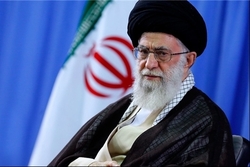 Leader of the Islamic Revolution Ayatollah Seyyed Ali Khamenei says enemies have been struggling to drive a wedge between the Iranian and Iraqi nations but have failed as the two neighbors are bound together by commonalities, particularly faith.
Leader of the Islamic Revolution Ayatollah Seyyed Ali Khamenei says enemies have been struggling to drive a wedge between the Iranian and Iraqi nations but have failed as the two neighbors are bound together by commonalities, particularly faith. RNA - “Enemies have been making considerable efforts to sow discord between the two nations, but thank God they have failed and will fail from now on too, because the main factors binding the Iranian and Iraqi nations are their faith in God and love for the household of Prophet Muhammad (PBUH) and [his grandson and the third Shia Imam] Imam Hussein (AS),” the Leader said.
Ayatollah Khamenei made the remarks in a meeting with a number of Iraqi Moukeb (roadside station) holders serving pilgrims of Imam Hussein who head to the holy Iraqi city of Karbala from across the world each year to commemorate Arba’een, which marks 40 days since the martyrdom anniversary of Imam Hussein.
The Leader thanked the Iraqi nation for hosting and warmly receiving the pilgrims and the Iraqi government and officials for ensuring security during the mourning rituals.
Ayatollah Khamenei described the Arba’een march as an unprecedented event of global significance, which could lay the groundwork for the establishment of a modern Islamic civilization.
The Leader said the Arba’een march is the manifestation of Ashura some 1, 400 years after Imam Hussein was killed.
Pointing to Islamic awakening among Muslim nations, Ayatollah Khamenei commended the Iraqi nation as a great, dignified and civilized nation with a strong willpower and said, “The Iraqi youths showed their power … and managed to foil a big plot of Daesh and other Takfiri [terrorists] and to defend the nation and their country in the face of a global plot to stoke civil war [in the Arab country].”
Elsewhere in his remarks, the Leader said that 40 years of plots, threats and sanctions by the US and its stooges and mercenaries against the Iranian nation have failed.
Millions of black-clad pilgrims from across the world converge on the holy Iraqi city of Karbala every year to commemorate Arba’een.
Large groups of mourners, many of them Iranians, travel on foot toward the holy city to take part in the largest annual Islamic gathering on earth.
Arba’een, meaning “the fortieth” in Arabic, is observed 40 days after Ashura, the tenth day of the lunar calendar month of Muharram, when Imam Hussein was killed along with dozens of his companions at the hands of the tyrant of the time, Yazid I, more than thirteen centuries ago.
This year Arba’een falls on October 30.
Imam Hussein is a highly-venerated figure not only among Shia Muslims but also among Sunnis, Christians, and people of other faiths.
847/940